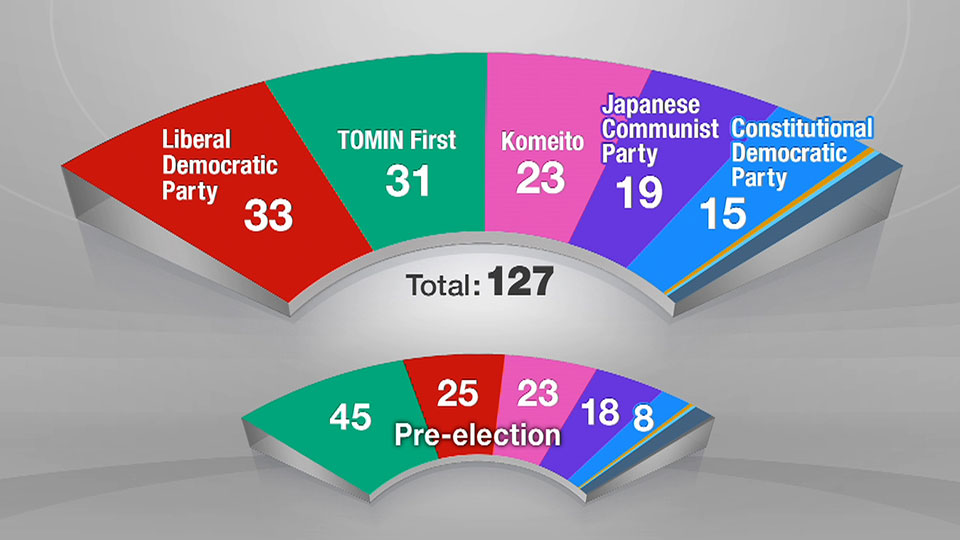LDP gains
Japan’s ruling Liberal Democratic Party and its coalition partner at the national level Komeito were aiming to win a majority of seats.
The LDP took 33 of the 127 seats to become the largest force in the assembly. That's a gain of eight seats from its previous representation. All 23 Komeito candidates secured assembly seats.
But the two parties failed to win a combined majority of 64 seats. The LDP also ended up with its second lowest seat tally ever. Some national candidates are now worried they will suffer a similar shortfall.
The TOMIN First party secured 31 seats. Tokyo Governor Koike Yuriko founded the regional party. In the previous election, four years ago, the party gained popular support as a new force and won the most seats. Koike serves as its special adviser, but in this election, she was hospitalized with fatigue three days before the official campaigning kicked off. She wasn’t able to provide the support many candidates were hoping for, but she joined the last-minute campaigning one day before the election. Ultimately, TOMIN First’s footprint in the assembly is diminished, but the party will retain a certain level of influence.
The Constitutional Democratic Party of Japan and the Japanese Communist Party did not run candidates against each other in some races to avoid competition among candidates. Both parties increased their presence in the assembly.

The parties’ reactions
Japan’s Prime Minister Suga Yoshihide spoke to reporters on Monday as the LDP president. He said he humbly accepts the outcome. He said he thinks there must be various factors behind the results. The party headquarters and the Tokyo chapter will work closely to analyze the results and prepare for the next election.
The results came amid dissatisfaction with measures against the new coronavirus and concerns about the Tokyo Olympics among people in Tokyo. A sense of crisis is spreading within the LDP ahead of the Lower House election.
In contrast, the opposition used a strategy they hope to deploy during the upcoming election. Fukuyama Tetsuro, the Secretary-General of the Constitutional Democratic Party of Japan, said, “The fact that there are so many votes of criticism against the LDP suggests that we could win votes by jointly backing a single candidate in a one-on-one battle with the ruling parties.”
Japanese Communist Party chairperson Shii Kazuo said, “The cooperation of opposition parties may have contributed to the loss of the majority of the LDP and Komeito. As the opposition parties have made substantial progress in forming a united front, we want to cherish the relationship of trust and lead it to the Lower House election.”
Lower House election to be held by autumn
The current term of Japan’s Lower House ends on October 21.The Lower House election will be the first nationwide vote since Prime Minister Suga took power. His leadership will be under the microscope now.
*After the election, it came to light that one of the winning TOMIN First candidates had caused an accident while driving without a license. The party expelled her.


